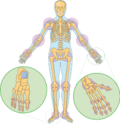Joint
Joint
A joint or articulation (or articular surface) is the connection made between bones in the body which link the skeletal system into a functional whole.<ref>
Joint(link). {{{website}}}.
</ref> They are constructed to allow for different degrees and types of movement. Some joints, such as the knee, elbow, and shoulder, are self-lubricating, almost frictionless, and are able to withstand compression and maintain heavy loads while still executing smooth and precise movements.<ref>,
The Circadian Rhythm of Core Body Temperature (Part I), Journal of Applied Physiology, Vol. 113(Issue: 2), pp. 347–353, DOI: 10.1152/japplphysiol.00789.2011, PMID: 22604885, PMC: 3404787,</ref> Other joints such as sutures between the bones of the skull permit very little movement (only during birth) in order to protect the brain and the sense organs.<ref>, Anatomy & Physiology: The Unity of Form and Function, New York:McGraw Hill, ISBN 978-0-07-337825-1,</ref>
Structure[edit]
Joints are mainly classified structurally and functionally. Structural classification is determined by how the bones connect to each other, while functional classification is determined by the degree of movement between the articulating bones.<ref>,
Anatomy & Physiology: The Unity of Form and Function, New York:McGraw Hill, ISBN 978-0-07-337825-1,</ref> In practice, there is significant overlap between the two types of classifications.
Structural classification[edit]
Structural classification names and divides joints according to the type of binding tissue that connects the bones to each other.<ref>,
Anatomy & Physiology: The Unity of Form and Function, New York:McGraw Hill, ISBN 978-0-07-337825-1,</ref> There are three structural classifications of joints:
- Fibrous joint - joined by dense irregular connective tissue that is rich in collagen fibers.
- Cartilaginous joint - joined by cartilage.
- Synovial joint - not directly joined, the bones have a synovial cavity and are united by the dense irregular connective tissue that forms the articular capsule that is normally associated with accessory ligaments.
Functional classification[edit]
Functional classification names and divides joints according to the type of movement they allow.<ref>,
Anatomy & Physiology: The Unity of Form and Function, New York:McGraw Hill, ISBN 978-0-07-337825-1,</ref> There are three functional classifications of joints:
- Synarthrosis - permits little or no mobility. Most synarthrosis joints are fibrous joints.
- Amphiarthrosis - permits slight mobility. Most amphiarthrosis joints are cartilaginous joints.
- Diarthrosis - permits a variety of movements. All diarthrosis joints are synovial joints.
Clinical significance[edit]
Damage to joints can be extremely painful and can lead to loss of function and deformity. Joint injuries and diseases usually produce a stiff, aching, "arthritic" joint. Arthritis is a common joint disorder featuring inflammation. A joint is an area of the body where two bones meet. A joint functions to allow movement of the body parts it connects. Arthritis literally means inflammation of one or more joints.
See also[edit]
References[edit]
<references />
External links[edit]
Ad. Transform your life with W8MD's Budget GLP-1 injections from $75


W8MD offers a medical weight loss program to lose weight in Philadelphia. Our physician-supervised medical weight loss provides:
- Weight loss injections in NYC (generic and brand names):
- Zepbound / Mounjaro, Wegovy / Ozempic, Saxenda
- Most insurances accepted or discounted self-pay rates. We will obtain insurance prior authorizations if needed.
- Generic GLP1 weight loss injections from $75 for the starting dose.
- Also offer prescription weight loss medications including Phentermine, Qsymia, Diethylpropion, Contrave etc.
NYC weight loss doctor appointmentsNYC weight loss doctor appointments
Start your NYC weight loss journey today at our NYC medical weight loss and Philadelphia medical weight loss clinics.
- Call 718-946-5500 to lose weight in NYC or for medical weight loss in Philadelphia 215-676-2334.
- Tags:NYC medical weight loss, Philadelphia lose weight Zepbound NYC, Budget GLP1 weight loss injections, Wegovy Philadelphia, Wegovy NYC, Philadelphia medical weight loss, Brookly weight loss and Wegovy NYC
|
WikiMD's Wellness Encyclopedia |
| Let Food Be Thy Medicine Medicine Thy Food - Hippocrates |
Medical Disclaimer: WikiMD is not a substitute for professional medical advice. The information on WikiMD is provided as an information resource only, may be incorrect, outdated or misleading, and is not to be used or relied on for any diagnostic or treatment purposes. Please consult your health care provider before making any healthcare decisions or for guidance about a specific medical condition. WikiMD expressly disclaims responsibility, and shall have no liability, for any damages, loss, injury, or liability whatsoever suffered as a result of your reliance on the information contained in this site. By visiting this site you agree to the foregoing terms and conditions, which may from time to time be changed or supplemented by WikiMD. If you do not agree to the foregoing terms and conditions, you should not enter or use this site. See full disclaimer.
Credits:Most images are courtesy of Wikimedia commons, and templates, categories Wikipedia, licensed under CC BY SA or similar.
Translate this page: - East Asian
中文,
日本,
한국어,
South Asian
हिन्दी,
தமிழ்,
తెలుగు,
Urdu,
ಕನ್ನಡ,
Southeast Asian
Indonesian,
Vietnamese,
Thai,
မြန်မာဘာသာ,
বাংলা
European
español,
Deutsch,
français,
Greek,
português do Brasil,
polski,
română,
русский,
Nederlands,
norsk,
svenska,
suomi,
Italian
Middle Eastern & African
عربى,
Turkish,
Persian,
Hebrew,
Afrikaans,
isiZulu,
Kiswahili,
Other
Bulgarian,
Hungarian,
Czech,
Swedish,
മലയാളം,
मराठी,
ਪੰਜਾਬੀ,
ગુજરાતી,
Portuguese,
Ukrainian





